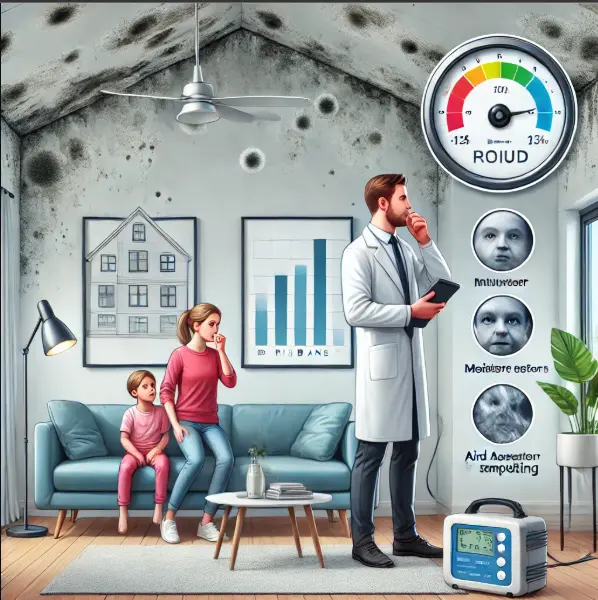Health Risks of Living with Mould in Brisbane

Health Risks of Living with Mould in Brisbane: Why Mould Testing is Essential
Brisbane‘s climate, known for its high humidity and warm temperatures, creates the perfect environment for mould growth. Mould in the home is more than just an unsightly problem—it can pose serious health risks. For those with allergies, asthma, or other respiratory conditions, mould exposure can lead to significant health issues. Even for healthy individuals, long-term exposure to mould can cause problems. This is why regular mould testing in Brisbane homes is essential.
How Mould Affects Your Health
Mould releases spores into the air that are easily inhaled. These spores can trigger a range of health issues, particularly for vulnerable groups like children, the elderly, and people with weakened immune systems. Some of the most common health risks include:
1. Allergic Reactions
Many people are allergic to mould spores. Exposure to these spores can cause symptoms such as:
- Sneezing
- Coughing
- Runny nose
- Itchy eyes
- Skin rashes
For those living in a mould-infested environment, these allergic reactions can become chronic. Symptoms may persist or worsen over time, especially in Brisbane’s humid climate, where mould can grow quickly and spread easily.
2. Asthma Flare-Ups
Mould is a known trigger for asthma attacks. When mould spores are present in the air, they can cause asthma symptoms to worsen. This is particularly dangerous for individuals with asthma, as prolonged exposure can lead to:
- More frequent asthma attacks
- Increased severity of symptoms, such as wheezing and difficulty breathing
- Greater reliance on medications to manage asthma
Mould testing can help identify whether mould is contributing to these problems, especially when asthma symptoms persist despite treatment.
3. Respiratory Problems
Even for individuals without pre-existing conditions, mould exposure can lead to respiratory issues. Mould spores can irritate the lungs and airways, causing:
- Persistent coughing
- Shortness of breath
- Sore throat
- Chest tightness
Over time, exposure to mould spores can lead to chronic respiratory problems, especially in Brisbane homes where mould tends to thrive in damp, warm conditions.
Mould in Hidden Areas: A Hidden Health Hazard
While some mould is easy to spot—growing on walls, ceilings, or around windows—much of it can remain hidden. Mould often grows in places where it isn’t immediately visible, such as:
- Behind walls: Leaky pipes, condensation, or poorly ventilated areas can cause mould to grow behind walls, where it goes unnoticed for long periods.
- Under flooring: Water damage from leaks or flooding can lead to mould growth under tiles or floorboards.
- In roof cavities: Roof leaks can cause moisture to accumulate in roof spaces, leading to mould growth that isn’t visible until significant damage occurs.
This hidden mould can still release spores into the air, contributing to indoor air pollution and potentially causing health problems for those living in the home. Professional mould testing is the only way to detect mould in these hidden areas.
Why Mould Testing is Crucial in Brisbane
Given the city’s humid climate, mould testing is particularly important for Brisbane homeowners. Regular mould testing can help identify hidden mould growth before it becomes a serious health risk. The Mould Group offers comprehensive mould testing services to detect and assess mould problems in homes. Our testing process involves:
- Visual Inspection: We begin by thoroughly inspecting your home for visible signs of mould growth and areas prone to moisture, such as bathrooms, kitchens, and basements.
- Air Sampling: We collect air samples from different areas of the home to test for mould spores. These samples are sent to a laboratory to determine the concentration and type of mould spores present.
- Surface Sampling: In areas where mould is suspected, we take surface samples to confirm the presence of mould and assess its type and extent.
- Detailed Report: Once testing is complete, we provide a comprehensive report that outlines the findings, including the types of mould present, spore concentrations, and recommendations for removal and prevention.
Who is Most at Risk?
Certain groups of people are more vulnerable to the health effects of mould. These include:
- Children: Young children are more sensitive to mould exposure, and repeated exposure can increase their risk of developing asthma and other respiratory problems.
- Elderly individuals: Older adults may be more susceptible to respiratory issues and weakened immune responses, making mould exposure particularly dangerous.
- People with asthma or respiratory conditions: Mould can exacerbate symptoms in those with pre-existing respiratory conditions, leading to more frequent or severe attacks.
- Individuals with weakened immune systems: People undergoing treatment for cancer, those with autoimmune diseases, or individuals recovering from illness are at greater risk of developing serious health complications from mould exposure.
Why DIY Mould Testing is Not Enough
Some homeowners may be tempted to use DIY mould testing kits, but these kits are often unreliable. They may only detect mould in visible areas and fail to uncover mould hidden behind walls or under floors. Additionally, DIY kits may not accurately measure the concentration of airborne spores, leaving homeowners unaware of the full extent of the problem.
Professional mould testing provides a much more comprehensive solution. The Mould Group uses advanced techniques to detect both visible and hidden mould, ensuring your home is safe from the health risks associated with mould exposure.
How to Prevent Mould in Brisbane Homes
While Brisbane’s climate makes it difficult to completely prevent mould, there are steps you can take to reduce the risk:
- Improve ventilation: Make sure high-moisture areas like bathrooms, kitchens, and laundry rooms are well-ventilated to reduce humidity levels.
- Fix leaks immediately: Repair any leaks in roofs, windows, or pipes to prevent water damage that can lead to mould growth.
- Keep your home dry: Use dehumidifiers in damp areas, and clean up any spills or water damage as quickly as possible.
Even with preventative measures, mould can still develop, especially in hidden areas. Regular mould testing is the best way to ensure your home remains mould-free and healthy.
Protect Your Health with Mould Testing
Mould is a serious health hazard that can affect everyone in the home, particularly those with allergies, asthma, or weakened immune systems. In Brisbane, where the climate encourages mould growth, regular mould testing is essential to detect hidden mould and protect your home’s indoor air quality.
At The Mould Group, we provide comprehensive mould testing services that go beyond surface detection. Our detailed reports help you understand the extent of any mould problem and take the necessary steps to remove it. Contact us today to schedule a mould inspection and ensure your home is safe from the health risks of mould.
Please see our article on The Process of Professional Mould Testing

